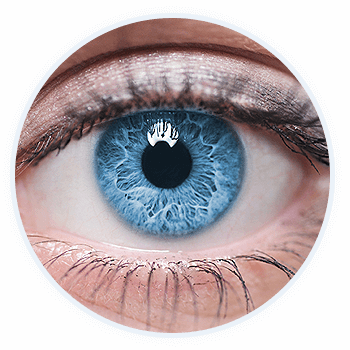 The cornea is the clear dome-shaped “window” on the surface of the eye. It not only protects the front of the eye but also allows light to enter the eye. Because the cornea is curved, it focuses the light, along with the lens of the eye, onto your retina. We frequently operate on the cornea to change its curvature for improved focusing.
The cornea is the clear dome-shaped “window” on the surface of the eye. It not only protects the front of the eye but also allows light to enter the eye. Because the cornea is curved, it focuses the light, along with the lens of the eye, onto your retina. We frequently operate on the cornea to change its curvature for improved focusing.
Corneal Disease Information
Corneal Disease encompasses a variety of disorders that can cause infection and inflammation of the cornea. These disorders can result from corneal scarring caused by trauma, the presence of bacteria or fungi in the cornea, keratoconus, Fuchs corneal dystrophy or infections such as corneal ulcers or Herpes.
As the front window of the eye, the cornea is vulnerable to injury and irritation. In addition to trauma and foreign bodies to the eye, corneal abrasion and erosion can be painful making the eye more sensitive to light and vision uncomfortable. The corneal surface usually heals within several days and can be treated by patching, ointment and antibiotic drops. Additional tear lubrication is also helpful.
Treatment of Corneal Disease
When the cornea becomes diseased, scarred or irregularly shaped, the eye cannot see clearly. The doctors at VisionPoint Eye Center can evaluate your condition and prescribe the most effective treatment that may include medical therapy or contact lenses.
Corneal transplantation may also be required after the effects of various eye disorders such as keratoconus, Fuchs corneal dystrophy and corneal scarring caused by trauma or infections from corneal ulcers or Herpes. The majority of corneal transplants are recommended because of a cloudy or irregular cornea that does not improve with medical therapy or contact lenses. Replacing the damaged cornea with clear, healthy donor tissue can restore impaired vision, relieve pain and protect the inner structure of the eye.
A corneal transplant involves replacing a diseased or scarred cornea with a new one. When the cornea becomes cloudy, light cannot penetrate the eye to reach the light-sensitive retina. Poor vision or blindness may result. At VisionPoint Eye Center our corneal specialist, Catharine J. Crockett, M.D., can replace the cornea by taking a healthy donor cornea from a person who chooses to donate their cornea after death.
The surgery is complex and the visual recovery slow, however corneal transplant surgery is the most successful of all tissue transplants. More than 40,000 corneal transplants are performed in the U.S. each year. Consult the doctors at VisionPoint Eye Center to discuss your questions or concerns about your eyes.
Corneal Cross-Linking
VisionPoint Eye Center is pleased to offer the only FDA approved therapeutic treatment for patients with progressive keratoconus and corneal ectasia called iLink Corneal Cross-Linking. The treatment uses medication eye drops and ultraviolet light to stiffen and strengthen corneas weakened by keratoconus.
Corneal collagen cross-linking is an innovative therapy that has transformed the treatment of progressive keratoconus. Historically, as many as 1 in 5 patients with progressive keratoconus have required a corneal transplant, with more than half needing multiple transplants within 20 years. While cross-linking can help slow or halt the progression of this sight-threatening disease, there is no cure for keratoconus.
Corneal Transplant
 A corneal transplant, also known as a corneal graft, keratoplasty or penetrating keratoplasty, involves the replacement of the central portion of a diseased or scarred cornea with a clear, healthy donor. Illustration
A corneal transplant, also known as a corneal graft, keratoplasty or penetrating keratoplasty, involves the replacement of the central portion of a diseased or scarred cornea with a clear, healthy donor. Illustration
The cornea is the clear dome shaped window in the front of the eye. Behind this clear window lies the iris, or colored part of the eye.
The cornea serves two purposes:
- It forms the front part of the eye’s outer wall and helps to shield the rest of the eye from germs, dust and other harmful matter.
- It is a window allowing the entry of light into the eye. Because of its curvature the cornea functions as a lens focusing incoming light and images onto the retina at the back of the eye.
Although the cornea is clear and seems to lack substance, it is actually a highly organized group of cells and proteins. It measures approximately half an inch in diameter and is thinner than a penny. Unlike most tissue in the body, the cornea contains no blood vessels to nourish or protect it from infection.
Corneal diseases like keratoconus can cause clouding, scarring and distortion of the cornea. Replacing the damaged cornea with clear, healthy donor tissue can restore impaired vision.
Corneal Evaluation
The doctors at VisionPoint Eye Center will help you evaluate your need for a corneal transplant and discuss the potential benefits of the surgery. The final decision is always yours, since you must weigh the potential risks against the possible benefits in making this decision. In some cases when an accident occurs that damages the cornea, the surgery must be done immediately. However, the majority of transplant cases occur because of a diseased cornea. In these cases, the patient has time to gather information, ask questions and decide if this is the best option and if so desired, schedule surgery.
Corneal Transplant Surgery
Corneal transplant surgery is done to improve vision, relieve pain and protect the inner structures of the eye. It is the most successful of all tissue transplants with more than 40,000 corneal transplants being performed in the United States each year. Dr. Catharine Crockett is the corneal specialist at VisionPoint Eye Center who performs corneal transplants.
Corneal transplant surgery generally takes about 1 1/2 hours and is performed under a surgical microscope. A cylindrical, cookie-cutter type instrument called a trephine is used to remove a round, button-shaped portion of the diseased or damaged cornea. A “button” of similar size is cut from the donor cornea and placed within the round opening. The donor tissue is then stitched in place with extremely fine nylon sutures.









